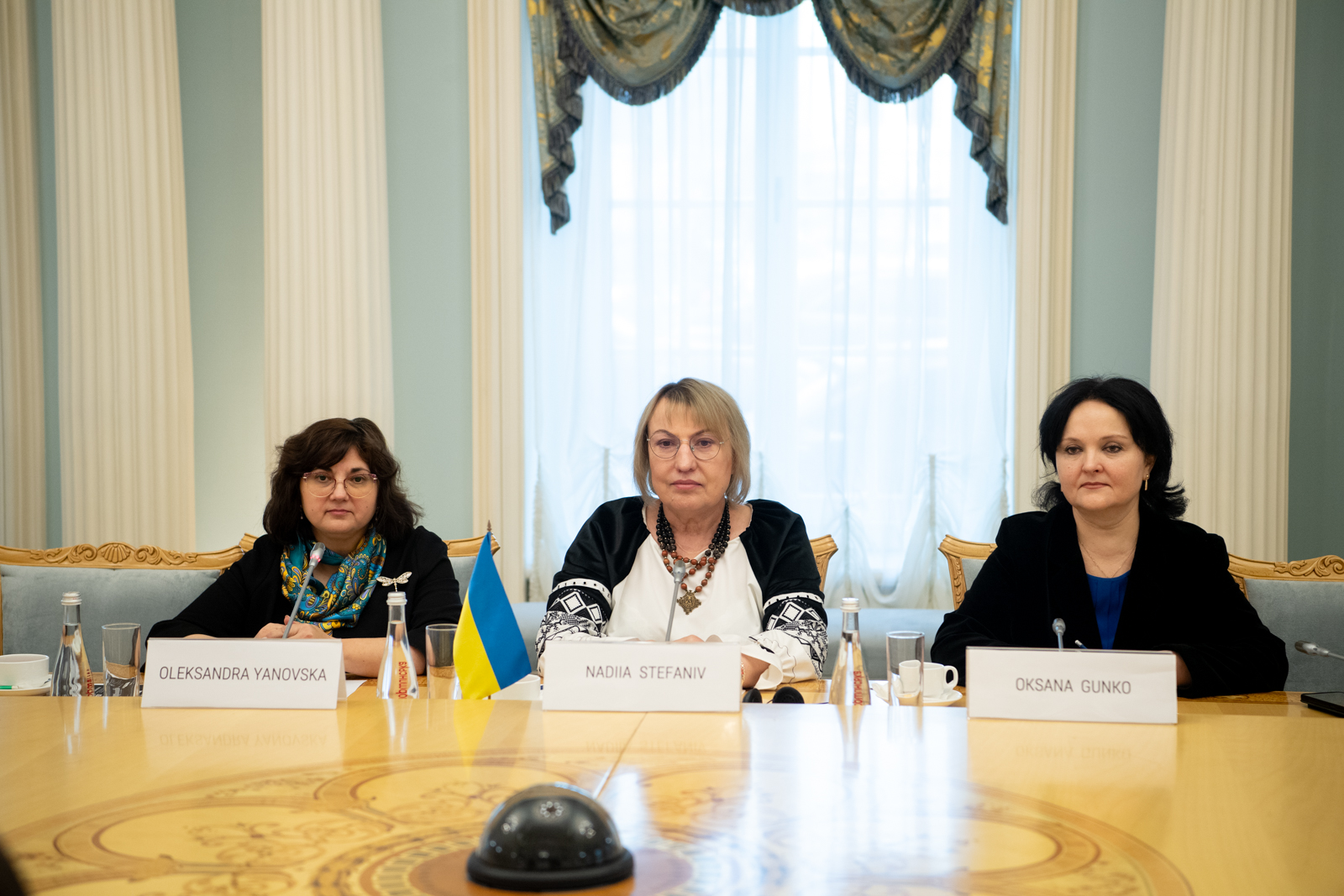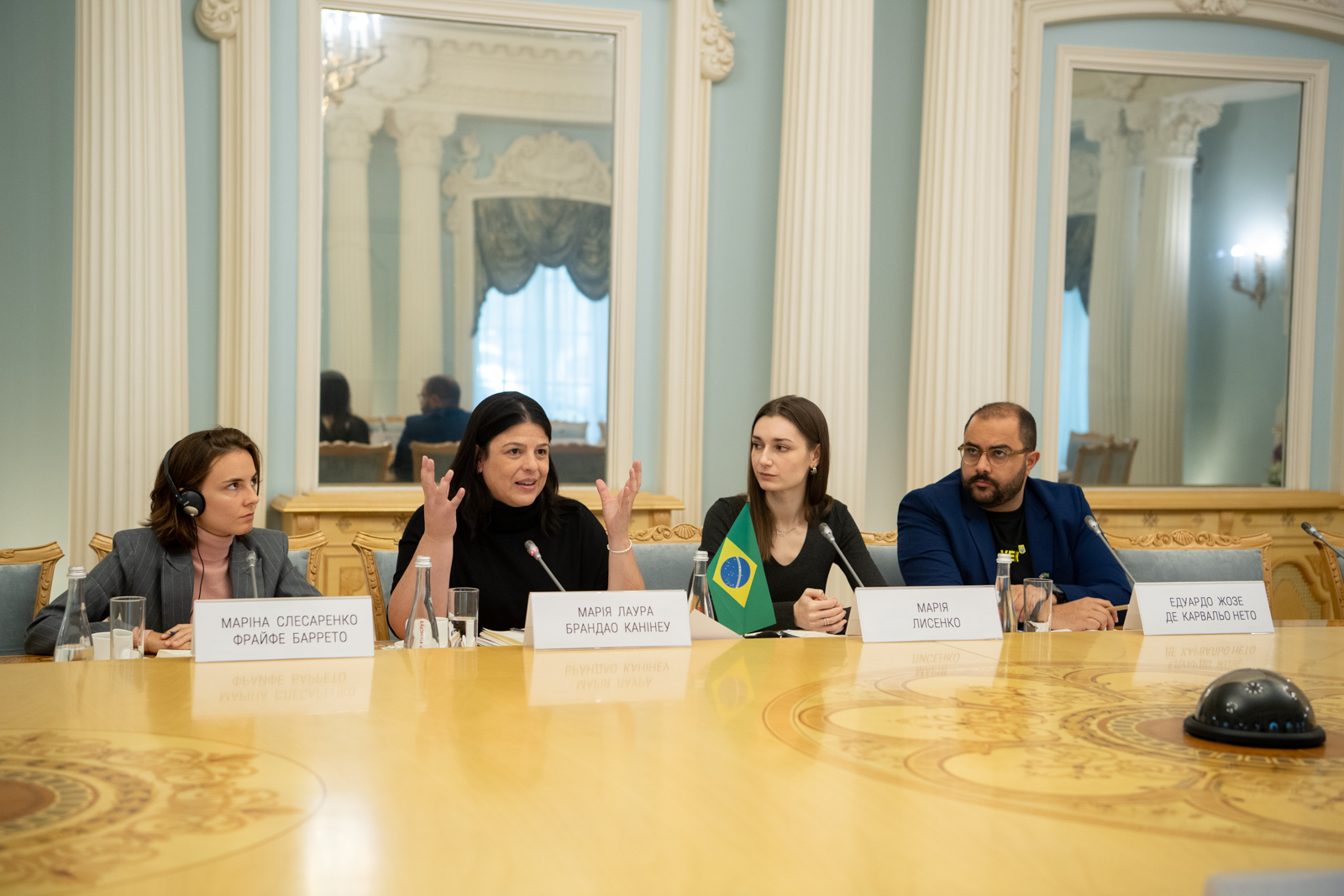Contact center of the Ukrainian Judiciary 044 207-35-46

Ukraine has been in a state of war unleashed by the russian federation for ten years. Russia's full-scale armed aggression against Ukraine has been going on for almost two years. Ukrainian society is living in extremely difficult conditions, so international support is particularly important for our country today.
This was emphasized by Supreme Court judges in the Criminal Cassation Court Nadiia Stefaniv and Oleksandra Yanovska, who welcomed the Brazilian delegation to the Supreme Court.
First of all, Nadiia Stefaniv expressed her gratitude to the members of the delegation for finding the opportunity to come to Ukraine and support the Ukrainian people in such a difficult time for our country. As the judge noted, Ukraine and Brazil have always had good relations, which is, in particular, due to the fact that the Ukrainian community in Brazil is one of the largest.
Nadiia Stefaniv also pointed out that during the UN General Assembly meeting, Brazil supported the general condemnation of russia's invasion of Ukraine and recognized that this invasion was a violation of international law.
The judge recalled that cooperation between the Supreme Court of Ukraine and the Supreme Federal Court of Brazil was launched in 1995. Therefore, this visit is a new step in continuing cooperation between the judicial systems of both countries.
Regarding the functioning of the judicial system under martial law, Nadiia Stefaniv noted that most Ukrainian courts continue to operate and administer justice despite the difficult conditions and constant security threats. In addition, it is during a full-scale war that public trust in the courts grows, as evidenced by the results of a survey of visitors to the Supreme Court conducted in 2023 at the initiative of the President of the Supreme Court, Stanislav Kravchenko.

The judge also said that there are certain problematic issues that need to be resolved immediately during a full-scale war. The key one is to create conditions to ensure the safety of all participants in the trial.
"Unfortunately, we also have heavy losses for the judicial system of Ukraine. Thus, Dmytro Konstantinov, a judge of the Krasnohrad District Court of the Kharkiv region, was killed while helping deminers, Liubov Kharechko, vice president of the Chernihiv Сourt of Appeal, was shot by the occupiers, and last November, Anatolii Nahornyi, a defender of Ukraine, the head of the Veselivskyi District Court of the Zaporizhzhia region, was killed in the Kupiansk sector. Their names are forever engraved in the history of Ukraine and the justice system," said Nadiia Stefaniv.
The judges of the Supreme Court elaborated on the peculiarities of the investigation and qualification of war crimes, as well as the possibilities of protecting the rights of victims of the actions of the russian federation and convicting the perpetrators of such crimes in absentia.
In particular, Oleksandra Yanovska said that, according to the Prosecutor General's Office, as of January 31, 2024, more than 124 thousand crimes of aggression and war crimes and more than 16 thousand crimes against national security have been recorded.
She also noted that there are already 683 suspects - representatives of the top military and political leadership of russia - in the main case of the aggression of russia. "At the same time, it is impossible to bring the top leadership of the aggressor state to justice in national courts. That is why the establishment of a special international tribunal to hold the top leadership of the russian federation accountable for the crime of aggression against Ukraine is currently a pressing issue. In this matter, Ukraine needs the support of the civilized world," the judge emphasized.
An equally important issue that Oleksandra Yanovska focused on was to bring russia to justice for the crimes of ecocide, because in particular the explosion of the Kakhovka hydroelectric power plant by russia led to terrible consequences, including the destruction of the entire ecosystem of a large territory of Ukraine.
Oleksandra Yanovska added that along with challenges, there are also achievements in the work of the criminal justice system. For example, the Criminal Cassation Court of the Supreme Court now hears most criminal cases by videoconference, which greatly facilitates the administration of justice in times of war.

For her part, Mariia Lysenko, representative of ZINC NETWORK, said that despite the geographical distance, Brazil and Ukraine, as democratic states, share common values - respect for human rights and adherence to standards of justice in court proceedings. In her opinion, the Russian-Ukrainian war is unique because it is a war between a member of the Council of Europe, a country that adheres to the Council of Europe standards and respects human rights, and a country that has withdrawn from all international institutions and ignores international law. So the struggle of Ukraine in this context is an example for other countries.
Representatives of the Brazilian delegation - cultural manager Eduardo José de Carvalho Neto, director of Human Rights Watch in Brazil Maria Laura Brandão Canineu, and researcher at the Center for Law and Democracy (NDD) of the Brazilian Center for Analysis and Planning (CEBRAP) Marina Slhessarenko Fraife Barreto - said they were honored to visit Ukraine and the Supreme Court in particular. They assured that the war in Ukraine is not only a Ukrainian problem. This is a global problem that the whole world must solve together. The representatives of Brazilian civil society stated that they hope to resume cooperation between the courts of Ukraine and Brazil and are encouraged to continue the dialogue on the importance of human rights.
In addition, the participants of the meeting discussed the prospects for the execution of sentences against war criminals convicted in absentia, the delimitation of the jurisdiction of national and international judicial institutions in connection with war crimes, mechanisms for compensation for damage caused by the russian aggression against Ukraine, and exchanged views on the continuation of judicial reform, the fight against corruption, and the role of the institute of investigating judges in ensuring that human rights are not violated at the pre-trial stage.
The meeting was also attended by Oksana Hunko, Acting Head of the Division of International Cooperation of the Supreme Court.